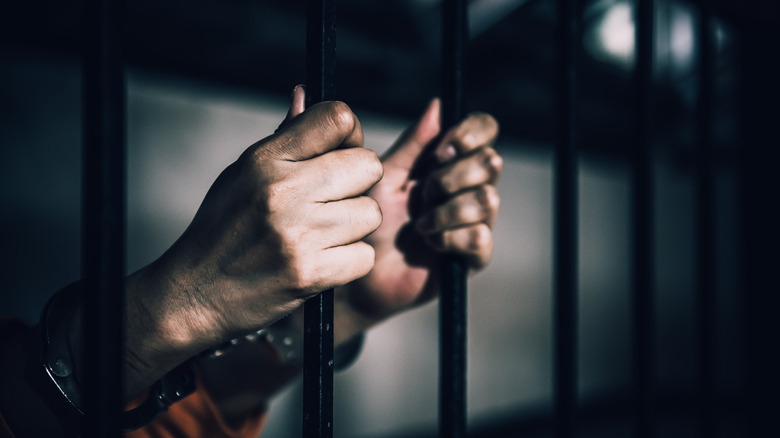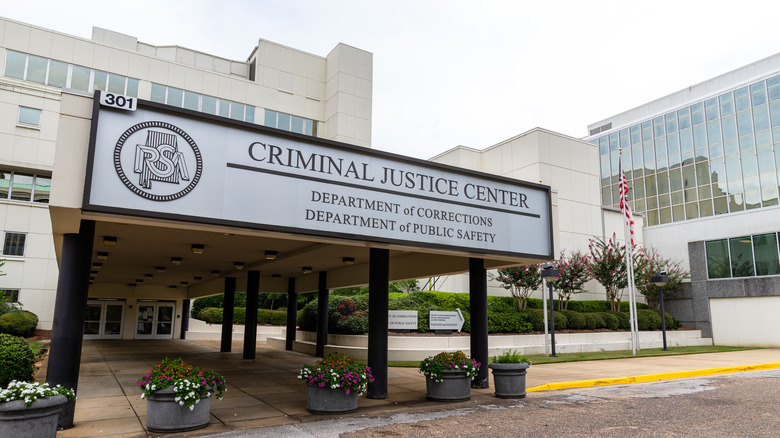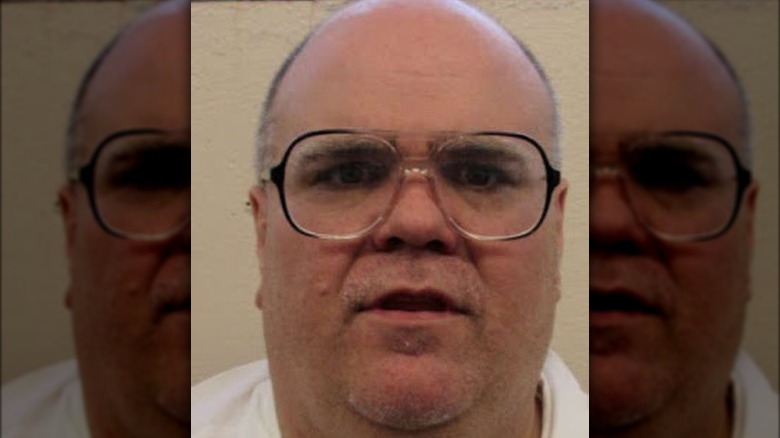What Is The Nitrogen Hypoxia Method Of Execution?
In 1999, Alan Eugene Miller was convicted of triple homicide in a workplace shooting and sentenced to death row in Alabama, as NBC News reports. Miller's execution was scheduled for September 22, 2022, possibly using a new method of capital punishment called nitrogen hypoxia. In the run-up to the date, experts were concerned about the efficacy of nitrogen hypoxia in cases of capital punishment and whether or not the new method of execution is a humane way to carry out a death sentence (via NPR). Interestingly, the state of Alabama ultimately attempted to execute Miller with lethal injection but failed. A lawsuit led to a settlement, with the state saying it would not execute him using this method and instead use nitrogen hypoxia for any future attempts, AL.com reported.
Approved in only three states (including Alabama), the nitrogen hypoxia method of execution was untested until 2024. For this reason, the U.S. Supreme previously turned down a Missouri death row inmate's request to die by that method.
Nitrogen hypoxia starves bodily tissues of oxygen
As the NPR website goes on to note, nitrogen hypoxia occurs when adequate levels of oxygen in the body's tissues are replaced by the typically non-poisonous gas, nitrogen, in a process called inert gas asphyxiation. That's opposed to hypoxemia, which is when the blood — not tissues — is deprived of oxygen. As nitrogen replaces oxygen in the tissues of the body, breathing will become challenging before the individual loses consciousness. There is little evidence that nitrogen hypoxia is a less painful way to die than lethal injection.
Per the Death Penalty Information Center, capital punishment by approved methods is legal at the federal level and allowed in 27 U.S. states. Meanwhile, 23 states have banned the death penalty, and in three states, the practice is halted per a governor-mandated moratorium. The decision to allow Alabama death row inmate Alan Eugene Miller to die by this method was up to the state corrections commissioner. There will likely be further litigation before the sentencing is carried out, as NBC News reports.
Miller reportedly requested to die by nitrogen hypoxia
Even though nitrogen hypoxia is a relatively untested method of execution and lethal injection was the initial choice for Alan Eugene Miller (pictured), the Alabama inmate reportedly requested to die by the new method for fear of needles. Miller said (per CBS News), "I did not want to be stabbed with a needle." The paperwork requesting the change was allegedly lost, but Miller's claim has raised the possibility that this new form of execution could take place in Alabama.
Despite their clients' reported willingness to die by nitrogen hypoxia, members of his defense team were reluctant to allow their client to be a test case for the method. Miller also turned down an offer from the state of Alabama to fit him with a mask through which nitrogen could be administered. At the time, several unknowns remained about the nitrogen hypoxia method of execution, including how long it will take, the best way to deliver the gas, and whether or not the team overseeing the process will stay safe, according to NPR. In 2024, the first execution by nitrogen hypoxia shed some light on them.
Kenneth Eugune Smith was killed by nitrogen hypoxia
As reported to the BBC, Kenneth Eugene Smith, who was convicted of murdering Elizabeth Sennett in 1989, was executed by nitrogen hypoxia in January 2024. He was the first person in the U.S. (and the world) to die by the controversial execution method. Smith's lawyers attempted to block the process, but the U.S. Supreme Court and a lower appeals court declined to do so.
In a statement (via CNN), Alabama Attorney General Steve Marshall suggested Smith's appeals were attempts to "bar the State from executing him by any method at all." According to the BBC, the state of Alabama suggested in a court filing that Smith would "lose consciousness within seconds and die in a matter of minutes."
The actual execution didn't appear to go as planned. Smith's religious adviser, Reverend Jeff Hood, said Smith remained alive for 22 minutes. "We didn't see somebody go unconscious in 30 seconds," he told reporters (via The Independent). "What we saw was minutes of someone struggling for their life." At a press conference, Alabama corrections commissioner John Hamm said Smith seemed to be "holding his breath as long as he could," The Guardian reported.
If you or someone you know needs help with mental health, please contact the Crisis Text Line by texting HOME to 741741, call the National Alliance on Mental Illness helpline at 1-800-950-NAMI (6264), or visit the National Institute of Mental Health website.


